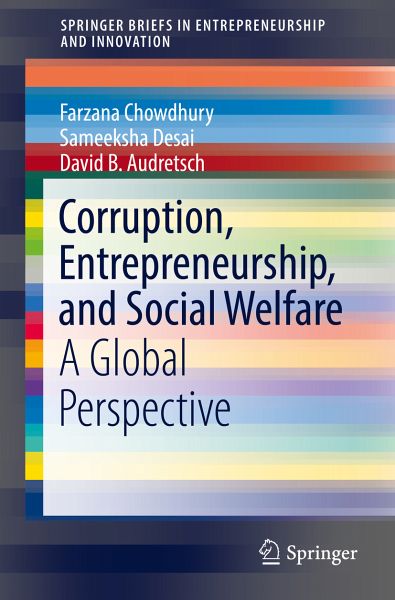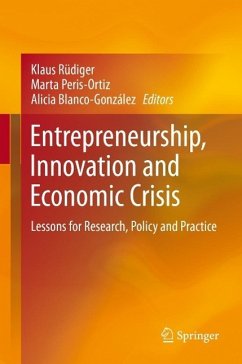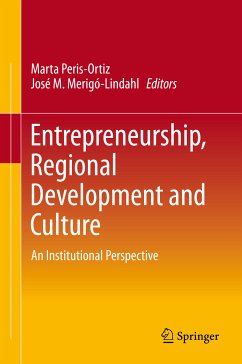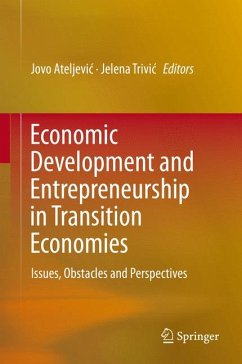
Corruption, Entrepreneurship, and Social Welfare (eBook, PDF)
A Global Perspective
Versandkostenfrei!
Sofort per Download lieferbar
40,95 €
inkl. MwSt.
Weitere Ausgaben:

PAYBACK Punkte
20 °P sammeln!
This book examines the complex relationship between corruption and entrepreneurship in countries of varying levels of economic development. The authors explore the ways in which social welfare policies have changed in current economic and political environments as well as key challenges faced by the welfare policies. In addition, this book addresses three key questions with regard to the impact of corruption on institutions and social welfare:. Is corruption an additional burden in extensive regulatory environment on different types of entrepreneurship---necessity entrepreneurship, opportunity...
This book examines the complex relationship between corruption and entrepreneurship in countries of varying levels of economic development. The authors explore the ways in which social welfare policies have changed in current economic and political environments as well as key challenges faced by the welfare policies. In addition, this book addresses three key questions with regard to the impact of corruption on institutions and social welfare:
. Is corruption an additional burden in extensive regulatory environment on different types of entrepreneurship---necessity entrepreneurship, opportunity entrepreneurship, total entrepreneurial activity, self-employment, and newly registered firms?
. Is corruption helpful for entrepreneurs who have aspiration to operate outside their home country border in highly regulated environment?
. How does corruption affect income distribution generated through entrepreneurial activity?
Entrepreneurship is an important factor for local and national economies as it generates employment and income that are crucial for economic development. Corruption can significantly influence the nature of decisions made by entrepreneurs, with profound effects on business creation, institutional development, and economic performance. For example, an entrepreneur with resources and networks might be able to influence the regulatory agencies to overlook violations, expedite permits, or bribe corrupt program administrators to violate the rules of distribution, exacerbating income inequality and obstructing economic growth and development. While corruption is not a new phenomenon, the current globalized economy has introduced trade into the corruption question as globalization puts pressure on countries to open borders to attract investments and gain a competitive advantage. However, many country level institutions do not always change as fast as the economic activity across borders, which can encourage corruption in order to bypass inefficient regulations and to successfully engage in entrepreneurship. The authors of the book examine this phenomenon.
Featuring policy implications and case studies, this book will appeal to graduate students, academics, professionals, practitioners, and researchers in entrepreneurship, international business and public policy.
. Is corruption an additional burden in extensive regulatory environment on different types of entrepreneurship---necessity entrepreneurship, opportunity entrepreneurship, total entrepreneurial activity, self-employment, and newly registered firms?
. Is corruption helpful for entrepreneurs who have aspiration to operate outside their home country border in highly regulated environment?
. How does corruption affect income distribution generated through entrepreneurial activity?
Entrepreneurship is an important factor for local and national economies as it generates employment and income that are crucial for economic development. Corruption can significantly influence the nature of decisions made by entrepreneurs, with profound effects on business creation, institutional development, and economic performance. For example, an entrepreneur with resources and networks might be able to influence the regulatory agencies to overlook violations, expedite permits, or bribe corrupt program administrators to violate the rules of distribution, exacerbating income inequality and obstructing economic growth and development. While corruption is not a new phenomenon, the current globalized economy has introduced trade into the corruption question as globalization puts pressure on countries to open borders to attract investments and gain a competitive advantage. However, many country level institutions do not always change as fast as the economic activity across borders, which can encourage corruption in order to bypass inefficient regulations and to successfully engage in entrepreneurship. The authors of the book examine this phenomenon.
Featuring policy implications and case studies, this book will appeal to graduate students, academics, professionals, practitioners, and researchers in entrepreneurship, international business and public policy.
Dieser Download kann aus rechtlichen Gründen nur mit Rechnungsadresse in A, B, BG, CY, CZ, D, DK, EW, E, FIN, F, GR, HR, H, IRL, I, LT, L, LR, M, NL, PL, P, R, S, SLO, SK ausgeliefert werden.












